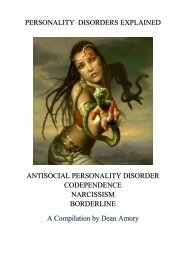Borderline - DEAN AMORY
Create successful ePaper yourself
Turn your PDF publications into a flip-book with our unique Google optimized e-Paper software.
Symptoms of <strong>Borderline</strong> Personality Disorder<br />
by John M. Grohol, Psy.D. - June 22, 2007<br />
{ INCLUDEPICTURE<br />
"http://www.prosieben.de/imperia/md/images/images/02_spielfilm_serie/desperate_housewiv<br />
es/desktops/dh_desktop1_1024_768.jpg" \* MERGEFORMATINET }<br />
The main feature of borderline personality disorder (BPD) is a pervasive pattern of instability<br />
in interpersonal relationships, self-image and emotions. People with borderline personality<br />
disorder are also usually very impulsive.<br />
This disorder occurs in most by early adulthood. The instable pattern of interacting with<br />
others has persisted for years and is usually closely related to the person’s self-image and<br />
early social interactions. The pattern is present in a variety of settings (e.g., not just at work or<br />
home) and often is accompanied by a similar lability (fluctuating back and forth, sometimes in<br />
a quick manner) in a person’s emotions and feelings. Relationships and the person’s emotion<br />
may often be characterized as being shallow.<br />
A person with this disorder will also often exhibit impulsive behaviors and have a<br />
majority of the following symptoms:<br />
<br />
<br />
<br />
<br />
<br />
<br />
<br />
<br />
<br />
Frantic efforts to avoid real or imagined abandonment<br />
A pattern of unstable and intense interpersonal relationships characterized by<br />
alternating between extremes of idealization and devaluation<br />
Identity disturbance: markedly and persistently unstable self-image or sense of self<br />
Impulsivity in at least two areas that are potentially self-damaging (e.g., spending, sex,<br />
substance abuse, reckless driving, binge eating)<br />
Recurrent suicidal behavior, gestures, or threats, or self-mutilating behavior<br />
Affective instability due to a marked reactivity of mood (e.g., intense episodic<br />
dysphoria, irritability, or anxiety usually lasting a few hours and only rarely more than<br />
a few days)<br />
Chronic feelings of emptiness<br />
Inappropriate, intense anger or difficulty controlling anger (e.g., frequent displays of<br />
temper, constant anger, recurrent physical fights)<br />
Transient, stress-related paranoid ideation or severe dissociative symptoms<br />
Details about <strong>Borderline</strong> Personality Disorder Symptoms<br />
Frantic efforts to avoid real or imagined abandonment.<br />
The perception of impending separation or rejection, or the loss of external structure, can lead<br />
to profound changes in self-image, emotion, thinking and behavior. Someone with borderline<br />
personality disorder will be very sensitive to things happening around them in their<br />
environment. They experience intense abandonment fears and inappropriate anger, even when<br />
faced with a realistic separation or when there are unavoidable changes in plans. For instance,<br />
becoming very angry with someone for being a few minutes late or having to cancel a lunch<br />
date. People with borderline personality disorder may believ that this abandonment implies<br />
that they are “bad.” These abandonment fears are related to an intolerance of being alone and<br />
a need to have other people with them. Their frantic efforts to avoid abandonment may<br />
include impulsive actions such as self-mutilating or suicidal behaviors.


















